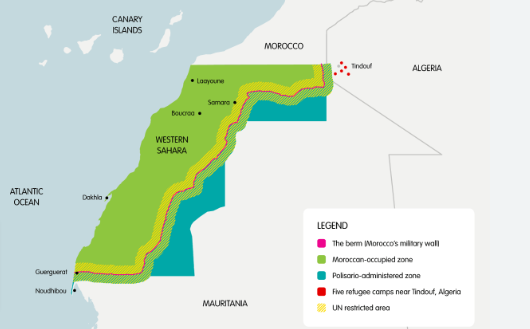Desert life is not your average cup of tea; and there is no intended pun here! The refugees of the camps of the Western Sahara live a very difficult life, torn as they are from their homeland. The days roll by, day in, day out; the Moroccan occupation grinds away, eating up the resources of the occupied country: Phosphate riches and some of the best fishing resources in the Mediterranean Sea. The impasse between the occupation and the forces of national liberation is all there is at the political level, since the strategic decision was taken to end the armed struggle and work instead, for a referendum to determine the fate of the Western Sahara.
Tea brewing and drinking have become an avenue to while away time as well as catch up on whatever news there was about life, if refugee existence can be so described. But the human spirit is incredibly resilient and in the camps of the Western Sahara, they express that resilience in cups of tea! The ceremony around tea is one that you immediately get used to if you visit with the Saharawi people. For as long as you are with them, you will drink tea and they cups come in waves! They have a saying about tea in the Western Sahara. A visitor ends up drinking a total of three cups in the first wave. The taste of each cup varies: coming first is the very strong and bitter cup. That first cup is said to be as bitter as life. Saharawi existence resembles the bitterness of life, what with continued occupation of their country and the years they have had to endure refugee existence. The second cup will come within a fifteen minute interval and it is not quite as bitter as the first cup; in fact, it is smooth tasting. Well, they say it is as smooth as death! Who can doubt that description, coming from a people who have had a fair share of martyrdom in the struggle to achieve freedom and independence.
The significant thing about the rituals around tea is that it is not sexist. A man could take up the challenge of brewing the tea or it might be a woman. Usually, people gather around and amongst the Saharawi dwellers of the desert, there is no forcible segregation of the sexes. Men and women freely mingle and there is a flow with a rhythm of life that is underscored by shared experiences of pain, death, longing and hope for freedom. Discussions are unrelenting and there is a lot of laughter and exchange of opinions. Saharawi people are remarkable hosts. They abandon their tents for the visitor with a total surrender which touches the depth of your own emotions, because deep down you know these people do not have much in terms of material possession. But for them, they are extremely delighted that you have been moved by their condition to have travelled from so far away. The hospitality is therefore heart-felt and sincere. Maybe fifteen minutes later and the third cup of tea is served. This third cup is the sweetest and it is not a mistake. The third cup of tea is said to be sweet as love!
Love is the motif of existence for the people here. There is unrestrained love of the homeland and that is why people can willingly make the sacrifice which marks daily life here. And there is also romantic love, of course. The Saharawi population is quite young and the young people are the future of these people. They are in school; some are learning trades and yet others are cultural workers while many are also in the army. The building blocks of a nation are being carefully constructed by the POLISSARIO movement and these efforts draw in the young men and women of the Sahara. There is therefore a lot of space for the romantic expression of love as well but it is not vulgarly expressed. It is as smooth as that third cup of Saharawi tea!
From the February 27th camp in the south west of Algeria through to the liberated zone of Western Sahara in Bir Lehlu, tea brewing and drinking rituals have a very similar pattern. We got sucked into it, because you cannot run away from this expression of solidarity. For me, the problem was that it went a long way to worsen my insomnia but I could not resist the three cups: one is bitter as life; the second is smooth as death while the third is as sweet as love. There is a deeply philosophical undertone to these descriptions because they speak to our human experiences of the life process. We are stalked by the bitterness of the life process; death takes away life in well, a smooth manner, according to the Saharawi people and then we enjoy the sweet taste of love, or don’t we, at least for as long as it lasts! So in expressions of desert hospitality, the Saharawi people also teach lessons of life as they have learnt them within the in-hospitable environments of the deserts. Truly, there is no one way of being human; and furthermore, there can be no inferior or superior human tradition.


